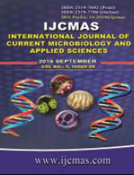


 National Academy of Agricultural Sciences (NAAS)
National Academy of Agricultural Sciences (NAAS)

|
PRINT ISSN : 2319-7692
Online ISSN : 2319-7706 Issues : 12 per year Publisher : Excellent Publishers Email : editorijcmas@gmail.com / submit@ijcmas.com Editor-in-chief: Dr.M.Prakash Index Copernicus ICV 2018: 95.39 NAAS RATING 2020: 5.38 |
Fusarium wilt is caused by Fusarium oxysporum, which leads to high losses of crops in many countries. Chemical fungicides are the primary means to control Fusarium wilt disease. Biological control has emerged as one of the most promising alternatives because it reduces the risks of chemicals on the environment and health. The aim of this study was to isolate bacteria from soil that have antagonistic fungal (F. oxysporum) activity and hence a biocontrol potential. Bacterial isolates were isolated from soil, and were then morphologically and biochemically characterized. The isolates were identified according to standard methods as Bacillus subtilis. Antifungal effect of the bacterial isolates was tested by measuring the growth inhibition zone of Fusarium oxysporum on Petri dishes. Pot trials with Bacillus subtilis were also carried out in order to see if it works in soil. Here we had four groups of pots, one of which has had F. oxysporum and treated by carbendazim as chemical antifungal (chemical treated group). The second group has had F. oxysporum and treated with Bacillus subtilis (biological treated group). The third group has had no pathogen added (the negative control group). The last group has had F. oxysporum without treatment (positive control group). The effect of the various treatments was measured in terms of the dry weight, stem length and root length of the tested plants. The results of this study have shown that dry weight and stem length of watermelon, cucumber and muskmelon were significantly increases in the chemically and biologically treated groups as compared to the positive control V group. It was also observed that the root length was significantly increased in the biologically treated group in all the three plants but not in the chemically treated group again in comparison to the positive control group. In conclusion, we have been able to isolate Bacillus subtilis strains that have a clear antifungal activity against Fusarium oxysporum. Therefore, we suggest, that our isolates can be used in the control of Fusarium oxysporum in agriculture, in particular in the protection of watermelon, cucumber and muskmelon.
 |
 |
 |
 |
 |